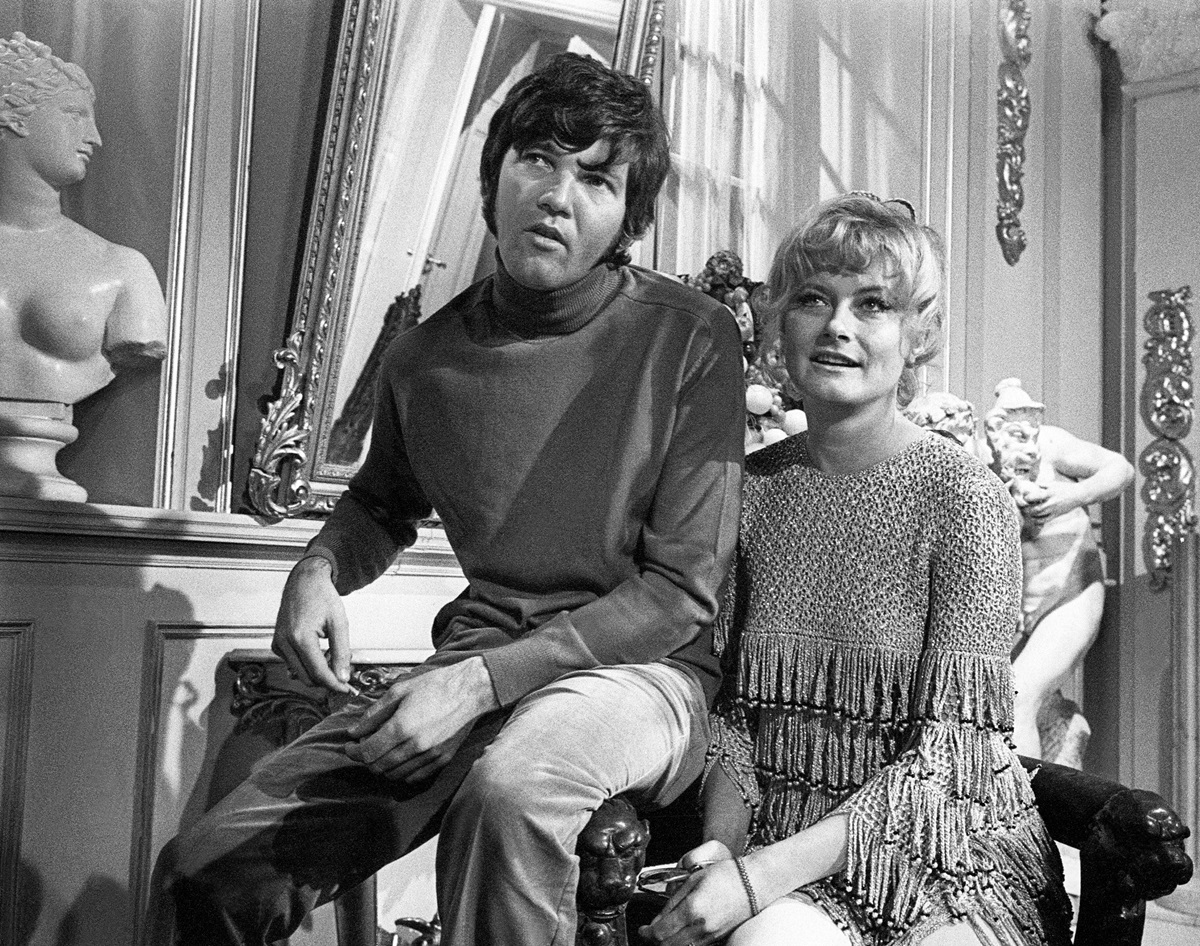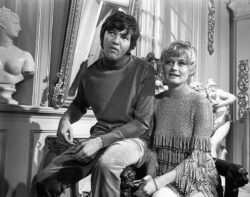Long Live the Swamp Fox!
North Louisiana’s Tony Joe White
Published: November 30, 2023
Last Updated: February 29, 2024

Photo by Roger Tillberg, Alamy Images
White with Swedish singer Monica Zetterlund at SVT studios in Stockholm.
“Polk Salad Annie,” the first single from White’s 1969 debut album Black and White, had taken nearly a year to make it onto the Billboard charts—but from there it took only a month to shoot up to the top ten. By the time Tony Joe White was goofing around on Johnny Cash’s stage, he had another hit under his hand-tooled snakeskin belt, too: soul singer Brook Benton’s cut of his romantic “Rainy Night in Georgia,” which topped the rhythm-and-blues chart and hit number four on the Hot 100. (Benton’s version was the smash, but it’s White’s voice on his own earlier recording that sounds like storm clouds rolling in, low, dark and thick.)
Funky blues whompers like “Polk Salad Annie” and slow, soulful, atmospheric ballads like “Rainy Night” are, by and large, the two sides of the Tony Joe White catalog. White grew up on a cotton farm in North Louisiana’s West Carroll Parish, where playing music was a hobby for everyone in his large family—until a record by Texas bluesman Lightnin’ Hopkins pushed White to make it more than that. “It just set me on fire,” he told the Houston Press in 2015. His brother had brought it home, and teenaged Tony Joe was hooked on his version of “Baby Please Don’t Go”: “I thought it was the coolest thing I’d ever heard, and that was about the time I started taking my daddy’s old guitar up to my room to practice every night.”
Another influence was Bobbie Gentry, whose Ode to Billie Joe deposed Sgt. Pepper’s Lonely Hearts Club Band from its long perch at the top of the album charts in the summer of 1967. In Gentry’s lush, cinematic country-soul storyscapes, White saw the rural southern world he knew and an artist who brought literary skill to evoking its romance, mystery, and humor. “I hadn’t started writing yet. I was listening to the radio one day and I heard ‘Ode to Billie Joe,’” he told the Guardian, in a 2018 appreciation of Gentry. “Man, this girl with a great voice, playing a cool guitar, and I thought: ‘How real can you get?’ I thought, I am Billie Joe—I’ve picked cotton, and been in the river and been in the swamps. I thought if I ever write something it’s got to be as real as ‘Ode to Billie Joe.’ It wasn’t too long after that I started on ‘Polk Salad Annie.’ I remember the radio, listening to it, the whole thing—it was like a turn-around, you know?”
White’s thumping guitar grooves and vivid lyrics evoked the terrain of his native state so well that somewhere along the line, he picked up the nickname “Swamp Fox.” He became the primary referent of the very small musical genre called “swamp rock” (also occasionally used to describe the chugging blues-rock of artists like Dale Hawkins and Creedence Clearwater Revival). Somehow it fits the humor of songs like “Polk Salad Annie” (with its memorable refrain “gator got your granny”); “Roosevelt and Ira Lee,” the story of two hapless would-be frog-hunters on a dark bayou night; and “Even Trolls Love Rock and Roll,” a sort of front-porch-sitting shaggy-dog story where, if the singer is to be believed, he spends a similar dark bayou night doing a command performance for the gnarled little guy who guards the bridge.
Tony Joe White’s thumping guitar grooves and vivid lyrics evoked the terrain of his native state so well that somewhere along the line, he picked up the nickname “Swamp Fox.”
In 1969 Dusty Springfield recorded an achingly tender cover of White’s “Willie and Laura Mae Jones”—a wistful snapshot of rural life and cross-racial friendship in an unspecified long-ago. At the time both “Polk Salad Annie” and Benton’s “Rainy Night in Georgia” were riding high on the charts. White never quite replicated the mainstream success of that period himself, but he continued on a long, steady, lifetime path of being what people like to call a “songwriter’s favorite songwriter” and a “musician’s favorite musician.” Elvis covered “Polk Salad Annie” and kept it in his live set throughout the ’70s; so did Tom Jones. In the ’80s White wrote and produced songs for Tina Turner during her epic second act as a solo star. And in 2014 the Foo Fighters invited him to perform “Polk Salad Annie” with them on The Late Show with David Letterman.
White was active up until the end of his life, releasing his final album Bad Mouthin’ only a month before his death at age 75 from a heart attack. He’d made his Grand Old Opry debut the same week in support of it. After his death, in the home studio he kept in Leipers Fork, Tennessee, just outside of Nashville, his son and manager Jody White found tapes dating back to the late ’60s. Working with the Black Keys’ Dan Auerbach, the younger White shepherded through a posthumous Tony Joe White project, Smoke from the Chimney, which came out in the spring of 2021. (In an interview for the British rock magazine MOJO that year, Jody White told me there was plenty more where that came from.)
In April 2023, the Northeast Louisiana Music Trail dedicated a marker in Tony Joe White’s memory in Oak Grove, Louisiana, his hometown. The Swamp Fox is gone; long live the Swamp Fox!
A columnist since 2016, Alison Fensterstock has written for 64 Parishes about music, dogs, witches, hippies, and other things.
